










 |
|
   |
Edwin
Booth
(1833-1893)

|


|
|
|
| "his
impersonation of Hamlet was vital with
all the old fire, and beautiful with
new beauties of elaboration. Surely
the stage, at least in our time, has
never offered a more impressive and
affecting combination than Mr. Booth’s
Hamlet of princely dignity,
intellectual stateliness, glowing
imagination, fine sensitiveness to all
that is most sacred in human life and
all that is most thrilling and sublime
in the weird atmosphere of ‘supernatural
solicitings,’ which enwraps the
highest mood of the man’s
genius!"
William Winter |
|

|
| Booth,
Edwin [Thomas] (1833-1893)
American actor/manager and second son
of the elder Junius
Brutus Booth. He
was born on November 13th on the Booth
family farm in Belair, Maryland, and
is best remembered as one of the
greatest performers of Shakespeare’s
Hamlet. He was a member of a famous
family of actors. His father Junius
Brutus (1796-1852) achieved popularity
second only to that of Edwin
Forrest.
His two brothers were Junius Brutus,
Jr. (1821-1883) and John Wilkes
(1839-1865), the assassin of President
Abraham Lincoln. Edwin however out
shown all of them and is universally
recognized as the greatest tragedian
of the 19th century American stage.

At the age of 13 he
accompanied and chaperoned his
eccentric father on his acting tours
where he endeavored to keep him sane
and sober, at the same time absorbing
the rudiments of acting. On September
10, 1849 at the age of 16, he made his
acting debut at the Boston Museum
playing Tressel to his father’s
Richard in Colley Cibber’s version of
Richard III. His performance met with
his father’s disappointment and
members of the theatrical
professional, who holding Junius
Brutus in great reverence, agreed that
his genius had not been passed onto
the son. A year later Edwin made an
unobtrusive New York appearance as
Wilford in The Iron Chest at
the National Theatre in Chatham
Street. It was not until the following
year that he received any attention
when at the last minute he filled in
for his ailing father as Richard III.
In 1852, under the management of
Junius Brutus Booth, Jr., Edwin
accompanied his father on a tour to
California. It was when his father
left to return to Maryland and died on
route later that year that he began to
establish an unassailable position for
himself on the stage. He remained on
in California playing San Francisco,
Sacramento and barnstorming through
the California mining towns. In
1854-55, he toured Australia and the
Sandwich Islands (now Hawaii). It was
on these tours that he mastered
virtually all of the roles for which
he would become famous, notably
Hamlet, Cardinal Richelieu, and Sir
Giles Overreach in A New Way to Pay
Old Debts. Those who had known him
back East were surprised when news
came that he had captivated his
audiences with his brilliant acting.
On his return to New York in 1857 he
was billed as "the hope of the
living Drama." His season not
only included Hamlet, Richelieu
and Sir Giles Overreach, but also King
Lear, Romeo and Juliet, The Lady from
Lyons and Othello (in which
he played Iago to Charles Fisher’s
Moor) as well as several now forgotten
works. From this time forward his
dramatic triumphs were warmly
acknowledged. His Hamlet, Richard III,
and Richelieu were pronounced to be
superior to the performances of Edwin
Forrest and his success as Sir Giles
Overreach surpassed his father. But
for all his praise, Booth had not yet
overcome the unruly temperament
inherited from his father. His acting
was occasionally fuddled by drink,
leading critics to say that even as
fine as his acting may be in one scene
there is no guarantee that he will not
walk feeble through the next, and let
it go by as if by default. In 1860, he
married the actress Mary
Devlin, by
whom he had his one surviving child, a
daughter, Edwina. It was the double
shock of Mary’s untimely death in
1863 and his failure to be at her side
because he was too drunk to respond to
the summons of friends that henceforth
made him abstemious.

By 1862,
when he took over management of the
Winter Garden Theatre his acting had
improved, although the critics still
complained about the unevenness of his
performances. While at the Winter Garden
he mounted many highly praised
Shakespearean productions at the house. In
all cases Booth used the true text of
Shakespeare, thus antedating by many
years a similar reform in England.
On November 25, 1864, all three
Booth brothers (Edwin as Brutus, Junius
Brutus as Cassius and John Wilkes as
Marc Antony) appeared together for the
only time in their careers in a benefit
performance of Julius
Caesar. The
performance being memorable both for its
own excellence and for the tragic
situation into which two of the
principal performers were subsequently
hurled by the crime of the third. The
following night on November 26th, Edwin
began a 100-consecutive nights
performance as Hamlet, the longest run
the play had ever had until that time.
He was thereafter identified with the
part for which his extraordinary grace
and beauty and his eloquent sensibility
peculiarly suited him. Less than a month
later, when John Wilkes assassinated
President Lincoln, Edwin went into
retirement and did not appear on the
stage for nearly a year. The incident
was a blow from which Edwin’s spirit
never recovered. When on January 1866,
he reappeared as Hamlet at the Winter
Garden Theatre, the audience showed by
unstinted applause their conviction that
the glory of the one brother would never
be imperiled by the infamy of the other.

When the
Winter Garden Theatre was destroyed by
fire, Booth built his own theatre (Booth's
Theatre) on the southwest corner
of Sixth Avenue and 23rd Street, opening
it on February 3, 1896, with Romeo
and Juliet. That same year, his
Juliet, Mary McVicker became his second
wife. But her nervous instability made
for an unhappy marriage. With an
excellent stock company, Booth mounted
many successful Shakespearean and other
productions including Romeo and
Juliet, The Winter’s Tale, Julius
Caesar, Macbeth, and Much Ado
About Nothing. Unfortunately, with
the playhouse sitting on the edge of the
main theatre district combined with a
lack of business acumen and a generous
and confiding nature, his ventures were
unsuccessful and he lost the theatre in
1873. With the raising of the grand
dramatic structure in 1874, Booth lost
everything and at the age of 40,
declared bankruptcy.

Ultimately
by hard work he recovered from his loses
and again accumulated wealth. He toured
the country and from 1880 to 1882
performed successfully in England and
Germany. Booth first acted in London in
1861 and when he returned in 1880, his
appearances at the Princess Theatre were
near failures until Henry
Irving, star
and manager of the much superior Lyceum
Theatre, invited him to costar at the
theatre in what proved to be a memorable
engagement with the two actors
alternating Othello and Iago. In 1882,
Booth played England again and the next
year toured Germany where the acclaim
given his Hamlet, Iago and King Lear
(considered, after Hamlet, his finest
roles) made the German engagement the
peak of his career.

On his
return from Europe, his financial
affairs improved permanently when, in
1886, he formed partnerships with the
Helena Modjeska, Madame Ristori and
Tommaso Salvini. But it was several
extensive US tour in association with
business and acting partner Lawrence
Barrett from 1886-91 that is the most
noteworthy. In 1888, his generous nature
was exemplified when he converted his
spacious residence on Grammercy Park
into a Club (The
Players) for actors and
eminent men in other professions. He
retained an apartment there until his
death. His farewell stage
performance was as Hamlet in 1891 at the
Academy of Music in Brooklyn. He died on
June 7, 1893. A statue of Edwin Booth
was erected in 1918 in Grammercy Park
opposite the Players, making Booth one
of the rare actors so honored. Booth
stood about five feet six inches tall.
His black hair, dark complexion, brown
eyes, and sad mouth gave him a slightly
Latin or Semitic appearance. Among the
roles that he played over the course of
his career were Macbeth, King
Lear, Othello,
Iago, Shylock, Wolsey, Richard II,
Richard III, Benedick, Petruccio,
Richelieu, Sir Giles Overreach, Brutus
(Payne’s), Bertuccio (in Tom Tyler’s
The Fool’s Revenge), Ruy Blas,
Don Cesar de Bazan and his most famous
part, Hamlet.

Booth’s
personal life was as plagued by tragedy
as any of the characters he portrayed.
His father and several other close
family members died insane; both his
wives died young; his brother’s murder
of Lincoln gave him his blackest moment;
and financial and drinking problems
often beset him. Quite possibly it was
the daunting distractions of his
personal life that determined his
conservative approach to acting. His
acting style was quieter than his father’s
has been and became increasingly more
sensitive and subdued. Unlike Edwin
Forrest, he never sought to promote
native plays; unlike Barrett, he never
risked reviving obscure or neglected
masterpieces. From early on he
recognized that he had only small
ability in comic or in basically
romantic plays. Tragedy was his forte,
and he remained content with his
reasonably large but relatively safe
repertory. |
|

|
|
(click
on photo to enlarge) |
|

|

|

|
| Birthplace
in Belair, MD |
Booth's
father
Junius Brutus Booth |
father
& son, age 13 |
 |
 |
 |
| Junius
Brutus Booth |
Junius
Brutus Booth, Jr. |
John
Wilkes Booth |
 |
 |
 |
| Painting,
age 19 |
1852,
age 19 |
1854,
age 21 |
 |
 |
 |
| After
his return from CA, 1857, age 24 |
Mary
Devlin |
1860,
at the time of his marriage to Mary
Devlin |
 |
 |
 |
| Mary
Devlin Booth & daughter Edwin,
London 1862 |
|
Edwin
& daughter Edwina, 1864 |
 |
 |
 |
| 1864,
age 32 |
 |
 |
 |
| with
daughter Edwina |
sketch |
Portrait |
| |
|
|
|
|
|
 |
 |
 |
|
|
|
 |
 |
 |
|
|
|
 |
 |
 |
|
|
|
 |
 |
 |
|
as
Hamlet |
 |
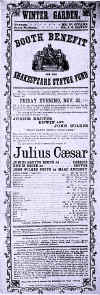 |
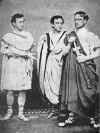 |
| Winter
Garden Theatre |
Julius
Caesar Playbill |
The
three brothers in
Julius Caesar |
 |
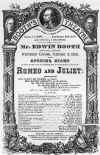 |
 |
| Booth
Theatre |
First
Playbill at
Booth's Theater |
Witham's
set design for Hamlet at Booth
Theatre |
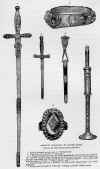 |
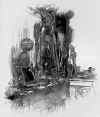 |
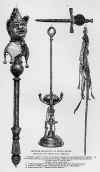 |
| Articles
belonging to Edwin Booth |
Booth's
dressing room
Broadway Theatre
December 1889 |
Articles
belonging to Edwin Booth |
|
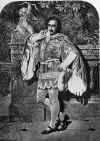
|
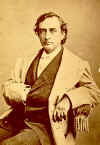
|
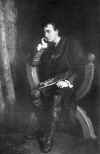
|
| as
Benedick |
|
as
Hamlet in 1887,
age 54 |
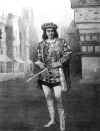 |
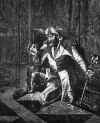 |
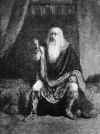 |
| as
Richard III |
as
Betuccio in
The Fool's Revenge |
as
King Lear |
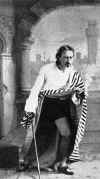 |
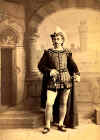 |
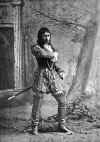 |
|
as
Iago |
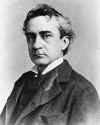 |
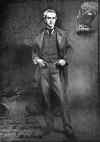 |
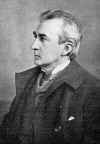 |
|
Sargent
portrait that hangs in The Players |
|
 |
 |
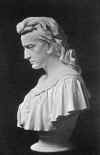 |
|
bust
as Brutus |
sketch
of assasination attempt |
bust
as Hamlet |
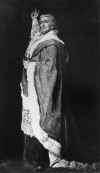 |
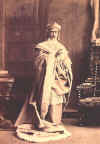 |
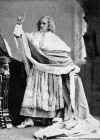 |
|
as
Richelieu |
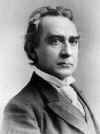 |
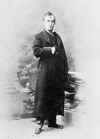 |
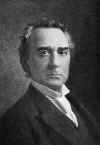 |
|
|
|
 |
 |
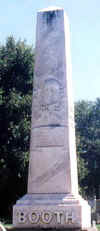 |
| with
granddaughter |
in
his last days |
Booth
family tombstone |
 |
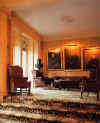 |
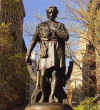 |
Unveiling
of Booth's statue in
Grammercy Park |
inside
The Players Club |
Booth's
Statue in Grammercy Park |
|
 |
|
 |
|
(click on the gramophone
to hear Edwin Booth's recording of his
Othello)
Othello, Act I Scene 3
Most potent, grave, and
reverend signiors,
My very noble and approved good masters,
That I have ta'en away
this old man's daughter,
It is most true; true, I have married
her:
The very head and front of my offending
Hath this extent, no more. Rude am I in
my speech,
And little bless'd with the soft phrase
of peace:
For since these arms of mine had seven
years' pith,
Till now some nine moons wasted, they
have used
Their dearest action in the tented
field,
And little of this great world can I
speak,
More than pertains to feats of broil and
battle,
And therefore little shall I grace my
cause
In speaking for myself. Yet, by your
gracious patience,
I will a round unvarnish'd tale deliver
Of my whole course of love; what drugs,
what charms,
What conjuration and what mighty magic,
For such proceeding I am charged
withal,
I won his daughter. |
|
 |
|
Joseph
Haworth & Edwin Booth
 |
|
Edwin
Booth played Ellsler’s
theatre several times while Joe was working there.
Joe played Laertes in Booth’s Hamlet, Cassio in
Othello, and Edward IV in Richard III.
Ellsler was sharing productions with a theatre in
Pennsylvania at this time, so Joe and Edwin Booth
toured there together and became very close
friends.
Here are three
quotes from Joseph Haworth regarding
Edwin Booth:
"I had the honor
while still in my teens of supporting
our own idol and ideal actor, Edwin
Booth. I appeared in Hamlet,
Othello, Lear and Macbeth;
also in The Fool’s Revenge and
Richelieu. My first meeting with Mr.
Booth was while playing in John
Ellsler’s stock company at the Euclid
Avenue Opera House, Cleveland. To this
latter gentleman I am indebted for my
earliest years upon the stage and
probably my most pleasant results since
achieved.
"I had read of the
tragedy that cast a mantle of blackness
around our hero of the stage for a brief
period and left the stamp of everlasting
sorrow on his pale, intellectual brow
and in his luminous eyes, and that
served to create in our own imaginations
the ideal Hamlet, Iago, and Lear.
Naturally, when the announcement came
that the great artist was coming to play
at ‘our theater,’ I was much exercised
and grew frightfully nervous---having
been cast (for the first time) for
Laertes, Cassio, and Edward IV in
Richard III. Henry Flohr was Mr.
Booth’s stage director, and he came two
weeks in advance to lighten the labor of
the master by drilling supernumeraries
and giving the principals the stage
business of the various plays. What
troubled me was my anxiety to please in
the foiling bout in the last act of
Hamlet. I played the part with all
the nervous force I possessed, and
perhaps a little more; and---reaching
the final scene---I met on the boards
for the first time Edwin Booth, as
Hamlet, face to face. There was
something indescribable in that look; I
was unnerved, and looked my
discomfiture. My heart seemed to come up
into my throat, but, as some one has
said, I had "presence of mind to swallow
it." Trembling visibly (Mr. Booth noted
it), I tried to fence, but was too
frightened. Mr. Booth smiled and said,
"You’re all right my boy; begin. The
encouragement of those sotto voce
arguments was all I needed. I fought
well, and when the final curtain was
lowered Mr. Booth came, assisted me to
rise, and said: "Young man, that is the
first time the fight has gone perfectly
the opening night." "I thank you," I
choked in earnest, went to my room,
disrobed, and shot home to my dear old
mother to tell what Mr. Booth had said."

"Having in play
accompanied him to Venice, Padua,
Denmark, France, Verona, and England, at
the conclusion of one performance he
asked me with all his princely grace, to
accompany him in person to supper.
Hastily dressing I knocked on the door
of Mr. Booth’s dressing room. Thrilling
with varied emotions I announced
modestly that I was ready to go.
" ‘Go?’ he asked.
‘Here’---and he produced a bag of
peanuts and a pitcher of beer. This was
not the ‘Feast of Lucullus,’ but by way
of dessert he informed me, after a feast
of reason and flow of bowl, I mean soul,
that I was destined to become a genius.
"Elated beyond
expression I bade him goodnight and
hurried home, only to meet another
disappointment, for on asking my mother
the real meaning of genius she, with her
usual frankness, quaintly replied: "It’s
a very bad thing to have around the
house."

"(Mr. Booth) was
simplicity itself off the stage; quiet
and retiring; deeply, not showily,
intellectual; and at our club---The
Players,’ which he gave us in his later
years---he loved to conjure up memories
of his youth and early struggles. Once,
when I complained that the classic drama
has gone to sleep (and as my aim had
always been to excel in that line of
endeavor I felt discouraged), he
replied:
‘Look at the years
I had accounted lost while in
California. I could act then; I had all
the enthusiasm of youth---rosy hopes,
great ambitions, etc; yet I could not
convince the people I was a good actor.
But, you see, it was a foundation I was
laying upon which to build my future
temple. I am now old and they are paying
five and ten dollars a seat, and I
cannot act at all. Yet it sometimes
occurs to me that art should be
encouraged more heartily in its budding
infancy.’"

"Booth’s Iago was
subtle and thoroughly Venetian in tone;
his Richelieu the most finished I had
ever seen; his Lear a masterpiece;
The Fool’s Revenge perhaps his
greatest performance. Brutus, in The
Fall of Tarquin, was also a superb
performance when he was minded to enact
it." |
|
|

|
|
Top
of page |
|
|
|
 |